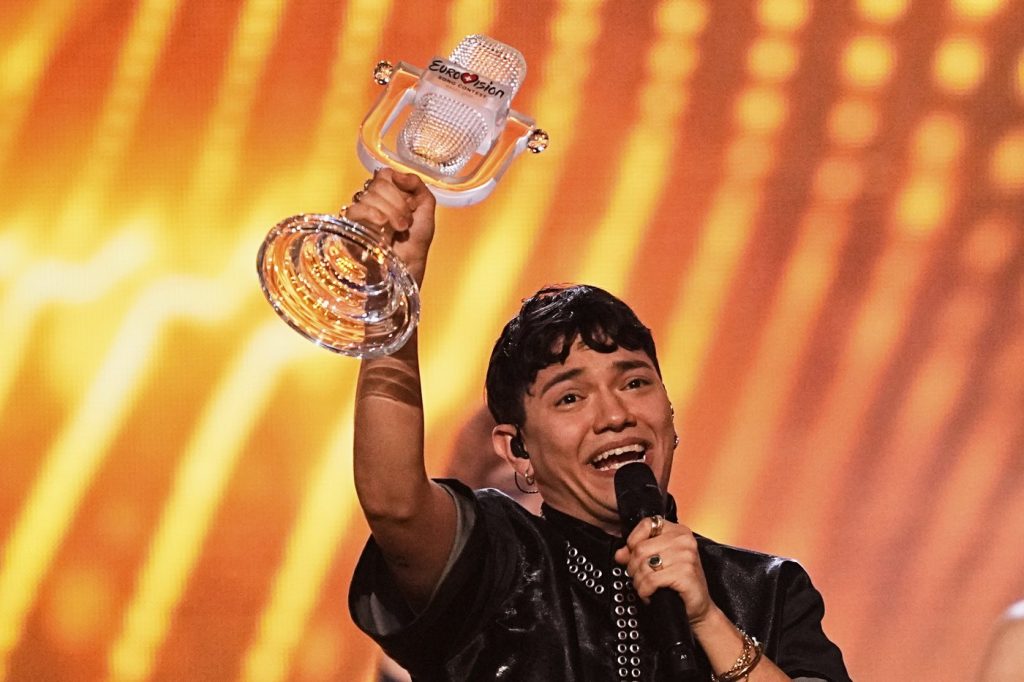BASEL, Switzerland (AP) — Austrians are preparing to celebrate the return of classically trained singer JJ, who triumphed at the 69th Eurovision Song Contest with his song “Wasted Love.” The track is notable for its blend of operatic, multi-octave vocals and a techno twist. The 24-year-old countertenor, performing at the Vienna State Opera, was expected to arrive at Vienna's airport on Sunday afternoon and hold a press conference later in the evening.
JJ, whose full name is Johannes Pietsch, became Austria’s third Eurovision winner, following Conchita Wurst’s victory in 2014 and Udo Jürgens in 1966. Upon receiving the iconic microphone-shaped glass Eurovision trophy after his win in Basel on Saturday night, JJ expressed his astonishment, stating, “This is beyond my wildest dreams. It’s crazy.”
Austrian leaders quickly congratulated JJ on his impressive achievement. President Alexander van der Bellen celebrated him in a video posted on X, exclaiming, “What a success! What a voice! What a show! All of Austria is happy.” Chancellor Christian Stoecker shared similar thoughts, stating on X, “What a great success — my warmest congratulations on winning #ESC2025! JJ is writing Austrian music history today!”
The Vienna State Opera also expressed their joy over JJ's victory. Opera director Bogdan Roscic remarked, “From the Magic Flute to winning the Song Contest is somehow a story that can only take place in Austria.” Several Austrian cities, including Innsbruck, Oberwart, and Wels, declared their interest in hosting the next Eurovision contest. JJ himself indicated his hope that Vienna would host the event, wishing to collaborate with his mentor, Conchita Wurst.
This year’s contest culminated in a thrilling final where Israeli artist Yuval Raphael placed second with her anthemic piece “New Day Will Rise.” The event was an exuberant celebration of music and unity, yet it was marred by the ongoing Gaza conflict, leading to protests regarding Israel’s participation. Despite the controversy, JJ emerged victorious in a nail-biting finale, overcoming significant public support for Raphael, who faced backlash from pro-Palestinian demonstrators.
During a post-victory press conference, JJ articulated the message behind his song, which explores themes of unrequited love. He stated, “Love is the strongest force on planet Earth, and love persevered.” Additionally, JJ expressed pride in being the first Eurovision champion with Filipino heritage and a proudly queer winner, emphasizing a message of love and acceptance.
The Eurovision Song Contest, which engages and sometimes divides audiences across Europe since its inception in 1956, featured a grand finale in Basel. The event showcased an eclectic mix of musical styles, with acts from 26 countries that had progressed from a pool of 37 entrants through two elimination semifinals. The performances captivated around 160 million viewers, with artists utilizing smoke machines, flames, and elaborate light displays in their three-minute acts to win over audiences and national juries.
Estonia’s Tommy Cash secured third place with his playful mock-Italian dance number “Espresso Macchiato,” while the Swedish entry KAJ, favored to win with the upbeat “Bara Bada Bastu,” finished fourth. Several highly anticipated performances, including those from French singer Louane and soulful Dutch artist Claude, failed to secure high rankings.
This year’s Eurovision contest was significantly impacted by the ongoing war in Gaza, creating a charged atmosphere during the event. Yuval Raphael, a survivor of the Hamas attack on a music festival, received a mixed response from the audience, while protests unfolded outside the venue. Both pro-Palestinian and pro-Israel demonstrations were held, though they were less intense than previous events. Police reported a few injuries stemming from the protests, highlighting the tensions surrounding the contest.
The European Broadcasting Union (EBU), which oversees Eurovision, tightened the contest’s code of conduct this year, reminding participants to uphold values of “universality, diversity, equality and inclusivity,” and maintain political neutrality. Eurovision director Martin Green stated that the organizers aimed to “re-establish a sense of unity, calm and togetherness this year in a difficult world” and commended all national delegations for their conduct during the event.










